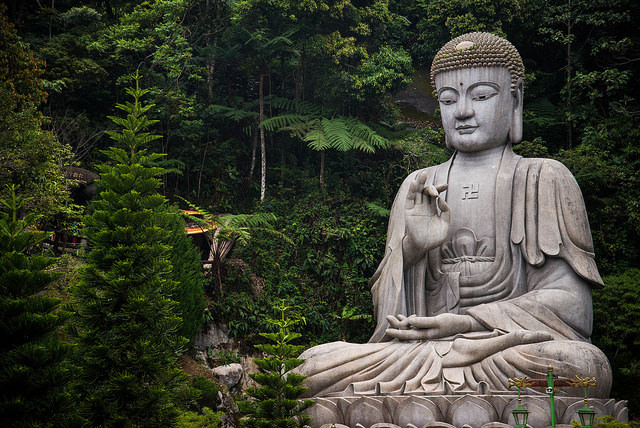I constantly emphasize the importance of understanding meditation before practicing it.
Several people who came to the sessions I gave last year thought that meditation is for relaxation. They left tired, and some were even surprised that they didn’t relax at all.
There are a few forms of meditation that are designed to make the meditator relaxed—such as guided meditations that consist of visualizing yourself at a calm place. However, the authentic Tibetan Buddhist form of meditation has almost nothing to do with relaxation. In fact, it might be the total opposite of our expectations.
It’s true that we often feel relaxed after meditation. We may feel calmer or more grounded—however, the process of meditation might not always be soothing. It’s hard work and challenging, especially for new meditators. Nonetheless, meditation is rewarding and beneficial if one commits to it.
The Tibetan term for meditation is “gom,” which literally means “to become familiar.” Consequently, meditation is not about running away. This is why meditation isn’t exactly about relaxing. Because whatever makes you relaxed moves you further away from your problems.
We all relax at the beach or in the mountains, amidst beautiful scenery. Why? Because swimming or enjoying nature distances us from our responsibilities and problems.
Meditation works the other way; it essentially brings you closer to the reality of your experiences, thoughts, emotions. It’s akin to going to the beach and bringing all your troubles with you in your bag. Not very comforting, right? But, stay with me.
If we aim at getting familiar with reality, then meditation is not an activity of the body, so it’s not really just about sitting there cross-legged. Meditation is an activity of the mind.
I came across an interesting passage while at my Introduction to Buddhism course that explains: “One Tibetan meditator realized emptiness while chopping wood, and another attained single-pointed concentration while cleaning his teacher’s room.” Hence, it doesn’t matter what we do, as long as we understand the true concept of meditation: real work happens inside our minds.
Meditation’s purpose is to help us get familiar with our thoughts, which we usually try to avoid. This is why meditation can be tricky and disturbing for new meditators. Bringing awareness to how things really are is often unpleasant. We’re accustomed to weaving a reality in our minds that suits our desires, and we often neglect the truth (the outer, actual reality).
We need to understand that our mind is a bulk of experiences that comprise thoughts and emotions that later transform into reactions. We’re all familiar with the reactions that we feel when something unpleasant happens—such as anger, hurt, disappointment, or jealousy.
Meditation teaches us to consciously act, instead of blindly react. We become the watchers of our minds and avoid the transformation of our thoughts into destructive reactions. To put it differently, we learn how to deal with thoughts and accept them, rather than trying to stop them.
During my meditation sessions, I mentioned this example of washing dishes. I told the participants that the thought of washing the dishes might arise while meditating. We shouldn’t flinch when silly thoughts surface. Meditation is not about forcing the mind to not produce thoughts—it’s about allowing the thoughts to just be, without our own further mental constructions.
Because, we typically tend to judge the thought and analyze it further. We might start thinking that we don’t have enough liquid soap, or we might not finish the dishes on time. It’s our human nature to turn a simple thought into a problematic issue. When the thought of washing dishes comes to mind, don’t judge it. Take note of it: “I need to wash the dishes when I get home.” Then let it go and accept it.
Through meditation, we become the masters of our own minds.
The mind no longer drags us with it; we drag it with us. Meditation helps us gain control over the reactions which arise without our consent. Instead of immediately reacting, we then stop for a moment. We let go of our misunderstandings of reality and begin to see things through a different lens. Hence, our reactions change.
Some people fear becoming passive, but the result is quite the opposite. Through meditation, we become more active—not lazy, but our actions become more conscious. They come from a place of understanding ourselves and reality, instead of coming from a place of ignorance.
Then, meditation becomes a way of life and not just a session that we attend. Meditation is a way of being that we adopt with time. It cultivates the positive states of our mind, such as compassion, love, serenity, kindness, and wisdom.
People who have been meditating for years ascertain that meditation has helped them to have fewer expectations of life and people, and it has helped them build better relationships. But the fact is, their life has improved because they’ve learned how to deal with their mind. They have realized that everything in life starts there.
This is why meditation is imperative—regardless our religion or beliefs. Buddhists explain that all humans have the same basic elements and experiences, which is why meditation can work for everyone.
Buddhists want us to remember that lifelong habits die hard. Recognizing the negative parts of the mind (such as jealousy, anger, blame, greed) is challenging—and, oftentimes, we don’t like to admit we have them. But, through willingness and commitment, we can break our ugly habits and rid ourselves of the habitual patterns that bring us nothing but trouble.
~
**Source: Introduction to Buddhism, Tushita Meditation Center
~
Relephant:
How to Prepare for Meditation: Instructions Given by a Buddhist Monk.
Why Buddhism can be Helpful for you—regardless of your Religion.
~
Author: Elyane Youssef
Image: Flickr/Carla Cometto
Editor: Yoli Ramazzina
Copy editor: Travis May
Social editor: Cat Monkman









Read 15 comments and reply